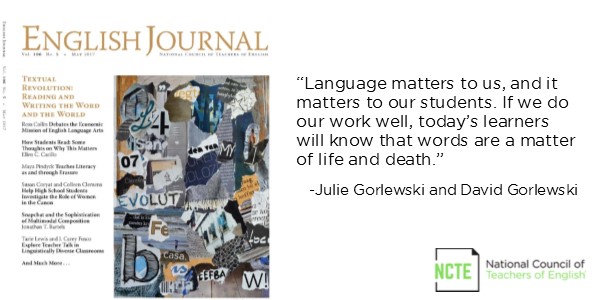The following post is by Julie Gorlewski and David Gorlewski, NCTE members and editors of the English Journal.
Words matter. Oral traditions of Indigenous peoples sustain connections to land, cultural traditions, and historical accounts. Written language in the Declaration of Independence set in motion colonial liberation from England. And digital speech has the capacity to create swift social movements across vast distances.
Laws are written in words. Justice and oppression are reinforced through language; words inspire hope and cause despair. Many ideas are born in and nurtured through language. Words offer a means of sharing dreams. Words also transmit hatred and incite violence. Words can spread love and foment malevolence. Words can bridge differences and build walls.
English teachers work in the world of words. Our practice involves immersing learners in language and ensuring that they are buoyed by powerful texts. We hope to teach them to consume and produce words, and to understand reading and writing are as natural and necessary as breathing. But words are not air; people can survive without exercising the power of language. And danger exists in such defenseless survival. Societies that cede the power of words to leaders risk both integrity and liberty. When “alternative facts” drive policy decisions, the public suffers. The path toward justice recedes. Words become weapons of domination.
Educators have the capacity to teach language as a tool of transformation. Poets are protesters. Authors reveal dystopian and utopian possibilities through literature. Journalists are soldiers in service of truth. In our classrooms, students can be poets, authors, and journalists. We can teach them to discover the multiple meanings in texts and to contest propaganda with truths. Teachers can model reflective, critical consumption of texts, as well as courageous production of essential dissent.
In this issue, authors explore how textual revolutions occur within and stretch beyond classroom walls. They investigate how texts have evolved and reflect on how this evolution influences how learners experience language as an instrument of supremacy or resistance.
Our learners are tomorrow’s leaders. They will invent textual applications beyond our imagination, but only if we teach them that they can. They will use words to challenge inequities and advocate for justice, but only if they learn to exercise the power of language. As English teachers, we are charged to cultivate skills and foster dispositions. Learners deserve the capacity and the desire to use language as a means of personal enlightenment and social transformation. We can embrace the evolution of discourse and teach students to reflect intentionally on how language affects humanity. Reflection, coupled with evolution, can lead to revolutionary textual practices, uses of words that can change the world.
Language matters to us, and it matters to our students. If we do our work well, today’s learners will know that words are a matter of life and death.
 Julie Gorlewski is chair of the Department of Teaching and Learning at Virginia Commonwealth University.
Julie Gorlewski is chair of the Department of Teaching and Learning at Virginia Commonwealth University.
 David Gorlewski works with preservice and practicing teachers and conducts research on literacy and professional dispositions. Both are former English teachers and members of NCTE, Julie since 2004 and David since 2001.
David Gorlewski works with preservice and practicing teachers and conducts research on literacy and professional dispositions. Both are former English teachers and members of NCTE, Julie since 2004 and David since 2001.

